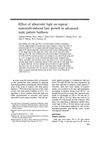 July 2003 in “Journal of Cutaneous Medicine and Surgery”
July 2003 in “Journal of Cutaneous Medicine and Surgery” The document concludes that various treatments for skin conditions are effective, but some require further research, and certain factors like gender and lifestyle can influence disease outcomes.
22 citations,
January 2012 in “Mediators of inflammation” Nonantibiotic macrolides show promise for treating various inflammatory skin conditions.
[object Object]  11 citations,
January 2022 in “Journal der Deutschen Dermatologischen Gesellschaft”
11 citations,
January 2022 in “Journal der Deutschen Dermatologischen Gesellschaft” Alopecia areata is a chronic condition causing hair loss, with new treatments targeting the immune system showing promise.
11 citations,
October 2021 in “Journal of The European Academy of Dermatology and Venereology” Topical finasteride is an effective and safer treatment for male hair loss.
 July 2023 in “IntechOpen eBooks”
July 2023 in “IntechOpen eBooks” New treatments for alopecia areata show promise, but more research is needed to confirm their effectiveness.
January 2019 in “Springer eBooks” Combination therapies might work better for some vitiligo patients, but results vary.
 151 citations,
February 2007 in “International Journal of Dermatology”
151 citations,
February 2007 in “International Journal of Dermatology” Alopecia areata causes hair loss, has no cure, and various treatments exist.
 21 citations,
June 1990 in “British Journal of Dermatology”
21 citations,
June 1990 in “British Journal of Dermatology” Systemic retinoids are effective for psoriasis but have side effects; benefits may outweigh risks, especially when reducing cancer risks from other treatments.
20 citations,
September 1983 in “Archives of dermatology” The new synthetic retinoid RO 13-6298 effectively treated severe psoriasis at low doses with manageable side effects.
117 citations,
February 1996 in “International Journal of Dermatology” A 300 mg monthly pulse of prednisolone effectively and safely treats widespread alopecia areata.
21 citations,
November 2015 in “The journal of investigative dermatology. Symposium proceedings/The Journal of investigative dermatology symposium proceedings” There is no cure for alopecia areata, but treatments like JAK inhibitors show promise.
 October 2023 in “The Cochrane library”
October 2023 in “The Cochrane library” The medicine baricitinib was found to notably improve hair regrowth in alopecia areata, but more research is needed on its side effects and other treatments.
 August 2023 in “JAAD international”
August 2023 in “JAAD international” Pediatric dermatologists have varied preferences for treating alopecia areata in children, with no standard FDA-approved treatments and some using JAK inhibitors despite risks.
34 citations,
January 2022 in “Molecules/Molecules online/Molecules annual” Natural ingredients in cosmeceuticals are beneficial for skin and hair health with few side effects.
65 citations,
November 2008 in “Pediatric Dermatology” Phototherapy is effective and well-tolerated for treating childhood psoriasis and pityriasis lichenoides chronica.
37 citations,
November 2011 in “Photodermatology Photoimmunology & Photomedicine” Narrowband UVB phototherapy alone is not very effective for treating alopecia areata.
1 citations,
August 2005 in “Springer eBooks” Alopecia areata is an autoimmune disease with genetic links, treatable with certain medications, and can affect mental health.
 November 2024 in “Health Science Reports”
November 2024 in “Health Science Reports” Light/laser therapy can effectively increase hair density in some types of alopecia, especially androgenic alopecia and alopecia areata.
 34 citations,
July 1999 in “Journal of The European Academy of Dermatology and Venereology”
34 citations,
July 1999 in “Journal of The European Academy of Dermatology and Venereology” Iron deficiency is not a significant cause of hair loss in women.
 80 citations,
October 1983 in “BMJ”
80 citations,
October 1983 in “BMJ” Minoxidil helps hair regrowth in alopecia patients, with 16 having good results and no side effects.
 8 citations,
May 1987 in “Journal of The American Academy of Dermatology”
8 citations,
May 1987 in “Journal of The American Academy of Dermatology” UV light does not significantly affect minoxidil's ability to treat male pattern baldness.
 3 citations,
May 2020 in “JAAD Case Reports”
3 citations,
May 2020 in “JAAD Case Reports” Two patients with psoriasis grew extra hair after using certain psoriasis medications.
 1 citations,
March 2004 in “Journal of The European Academy of Dermatology and Venereology”
1 citations,
March 2004 in “Journal of The European Academy of Dermatology and Venereology” Hair loss improved with treatment and successful transplant.
 December 2004 in “Medicine”
December 2004 in “Medicine” Pregnancy can cause skin changes and may affect pre-existing skin conditions, with some treatments not safe for use during pregnancy.
 July 1975 in “Archives of Dermatology”
July 1975 in “Archives of Dermatology” The document suggests a possible connection between rapid weight loss and hair loss, and reports a case of skin condition improvement after stopping acne medication.
 June 2006 in “British Journal of Dermatology”
June 2006 in “British Journal of Dermatology” The document reports unique growth lines in a child after Stevens-Johnson syndrome, skin reaction from parsnips and sun in a girl, and itchy skin with xanthomas in a boy with Alagille syndrome.
 147 citations,
April 1994 in “Drug Safety”
147 citations,
April 1994 in “Drug Safety” Some drugs can cause hair loss or increase hair growth, but these effects are usually reversible when the drug is stopped.
[object Object]  63 citations,
December 2002 in “Archives of Dermatology”
63 citations,
December 2002 in “Archives of Dermatology” The 308-nm excimer laser is a promising treatment for vitiligo with varying success and mild side effects.
 50 citations,
December 2010 in “Dermatologic Surgery”
50 citations,
December 2010 in “Dermatologic Surgery” Laser treatment can stimulate hair growth for male pattern hair loss.
 40 citations,
August 2006 in “Current Drug Safety”
40 citations,
August 2006 in “Current Drug Safety” Some drugs can cause hair loss, excessive growth, or color changes, often reversible but sometimes permanent.




















